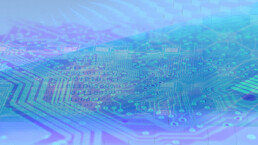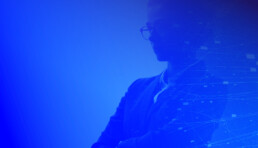#CORENEXTWOMENSDAY – An interview with Sabine Oeste
International Women's Day (IWD) is a global holiday celebrated annually on March 8 as a focal point in the women's rights movement, bringing attention to issues such as gender equality, reproductive rights, and violence and abuse against women. This year, International Women’s Day is “DigitALL: Innovation and technology for gender equality”.
In COREnext, we are so happy to work with amazing women on the project.
Today we are pleased to introduce you to Sabine Oeste, who works at the Barkhausen Institut for COREnext as a Project Manager.

Copyright of the picture © Andreas Scheunert |
INTERVIEW
- WHAT IS YOUR MISSION WITHIN THE CORENEXT PROJECT?</strong >
As a Project Manager, I’m responsible so everyone in the project can collaborate excellently. This also addresses topics of gender equality. Diverse teams are the most productive ones, especially when facing complex tasks. We still need more women in engineering to become more excellent results.
- THIS YEAR, THE INTERNATIONAL WOMEN’S DAY THEME IS “DIGITALL: INNOVATION AND TECHNOLOGY FOR GENDER EQUALITY”. UNFORTUNATELY, THE OPPORTUNITIES OF THE DIGITAL REVOLUTION ALSO PRESENT A RISK OF PERPETUATING EXISTING PATTERNS OF GENDER INEQUALITY. WHAT DO YOU THINK ABOUT THAT?</strong >
It must prevent that there are digital solutions from resulting in gender inequality. It is important to address these topics in designing and developing new technologies.
- EVEN THOUGH WE SEE MORE WOMEN PURSUING CAREERS IN LIFE SCIENCES, WE STILL HAVE A LONG WAY TO GO, BASED ON UNESCO STATISTICS. HOW CAN WE INCREASE THE NUMBER OF WOMEN IN SCIENCE, TECHNOLOGY, ENGINEERING AND MATHEMATICS (STEM) DISCIPLINES?
We still need more women in education in STEM disciplines. It is important to support girls and young women in their career choice and encourage them to select a job in this area. Companies can offer special events to reach girls and women. You can support women already working in this field by providing challenging job opportunities and establishing a family-friendly work culture (e.g., flexible working hours and meeting schedules).
- WHAT INSPIRES YOU IN YOUR WORK?
I like the work in interdisciplinary and diverse teams with challenging tasks.
#CORENEXTWOMENINSCIENCE – An interview with Jian Yiyun
Our Women in Science campaign comes to its third issue with the interview with Jian Yiyun. This year International Women’s Day has the theme “DigitALL: Innovation and technology for gender equality”, and we want to celebrate it and make visible the work the women in the team are doing.
 |
After graduating from the Beijing Institute of Technology (BIT), China, in 2013, Yiyun Jian majored in instrumentation engineering, Master’s degree. She then worked as a digital hardware engineer at the Institute of Geology and Geophysics, Chinese Academy of Sciences.
Since August 2022, working at IHP in Germany as a Ph.D. student, focusing on MAC layer design of the 6G project and digital hardware implementation (FPGA based) of the 6G project. |
Interview
- WHAT IS YOUR MISSION WITHIN THE COREnext PROJECT?
My main task is to contribute to the functionality of digital components of trustworthy communication in the COREnext project.
- WHAT ARE THE MOST SIGNIFICANT CHALLENGES YOU ADDRESSED/FACED IN YOUR CAREER?
My most significant challenges are innovating advanced technologies to achieve high reliability and resilience, precise and low-latency communication and sensing.
- THIS YEAR, INTERNATIONAL WOMEN'S DAY HAS THE THEME "DIGITALL: INNOVATION AND TECHNOLOGY FOR GENDER EQUALITY", AND THE INTERNATIONAL DAY OF WOMEN AND GIRLS IN SCIENCE FOCUSED ON "DEVELOPMENT GOAL". WHAT DO YOU THINK IS THE ROLE OF SCIENCE IN SUSTAINABLE DEVELOPMENT?
Science is significant in sustainable development; we can predict, prevent and protect using the technologies.
- EVEN THOUGH WE SEE MORE WOMEN PURSUING CAREERS IN LIFE SCIENCES, WE STILL HAVE A LONG WAY TO GO, BASED ON UNESCO STATISTICS. HOW CAN WE INCREASE THE NUMBER OF WOMEN IN SCIENCE, TECHNOLOGY, ENGINEERING AND MATHEMATICS (STEM) DISCIPLINES?
To provide more opportunities and awards for women and families and parenting support.
- WHAT INSPIRES YOU IN YOUR WORK?
The achievements genuinely contribute to the new technologies that may help humanity and all lives.
#CORENEXTWOMENINSCIENCE - An interview with Anastasia Grebenyuk
On 11 February, we celebrated the International Day of Women and Girls in Science. The Day focuses on the fact that science and gender equality are vital for achieving internationally agreed development goals, including the 2030 Agenda for Sustainable Development. Regarding the upcoming International Women's Day on the 8th of March, the theme this year will be “DigitALL: Innovation and technology for gender equality”, so we will continue giving visibility to the women in the team.
 |
Dr. Grebenyuk Anastasia, is 38 years, and has a PhD in Experimental particle physics. Before Ericsson I works at the Large Hadron Collider (LHC) at CERN. She is the mother of two kids. |
Interview
- What is your mission within the COREnext project?
Develop a machine learning algorithm for radio fingerprinting. - What are the most significant challenges you addressed/faced in your career?
To perform intelligent tasks which require out-of-box thinking and deep knowledge in the relevant field, being engaged in multiple projects. - International Day of Women and Girls in Science focused on development goals this year. And International Women's Day is focused on technology. What do you think is the role of science in sustainable development?
Scientists are increasingly expanding their knowledge in areas such as climate change, increasing resource consumption, demographic trends and environmental degradation. Developments in these and other areas must be considered when designing long-term development strategies. Science must continue to play an increasingly important role in promoting the efficient use of resources and finding new methods, means and alternatives for development. - Even though we see more women pursuing careers in life sciences, we still have a long way to go, based on UNESCO statistics. How can we increase the number of women in science, technology, engineering and mathematics (STEM) disciplines?
As parents, we should make kids interested in science/technology/physics/math in their earlier childhood, independent of gender. Unfortunately, in some countries, society puts its frames on the choice of education and profession among women. We should dispel prejudices and ensure that the choice of education comes from our interests and not from society's stereotypes. - What inspires you in your work?
Challenging tasks, curiosity for knowledge, smart people
#CORENEXTWOMENINSCIENCE - An interview with Parisa Aghdam
On 11 February, we celebrate the International Day of Women and Girls in Science. The Day focuses on the fact that gender equality in science (and in general) is vital for achieving internationally agreed development goals, including the 2030 Agenda for Sustainable Development.
Within COREnext, scientific researchers(women and men) are working together to bring the project to an outstanding level.
You can meet some scientific women involved in the project at the #COREnextWomenInScience campaign.
Today the campaign is in its first issue, and we published the interview with researcher Parisa Aghdam.
 |
Parisa Aghdam holds the research leader role and leads the Electromagnetics team at Ericsson Research, Gothenburg, Sweden. During the last 6 years of working at Ericsson, she has mainly been driving 5G PoCs/pre-dev activities and the analogue front-end team in millimeter wave (mmW) 6G testbed. Her research interests are microwave and mmW hardware solutions and technology components for 5G/6G applications. |
- What is your mission within the COREnext project?
Our Ericsson research team (Gothenburg) will mainly study analogue techniques and components (work package 5) for ultra-high-speed data links at short distances. The outcome of this research could be used, for instance, in disaggregated 6G radio base stations. - What are the most significant challenges you addressed/faced in your career?
For me, the toughest has been when I experienced periods of career stagnation, as I'm sure many of us have, due to a lack of challenge in my work. Now, I am grateful to be employed in an environment that values a supportive and inclusive culture, which has aided me in overcoming such struggling times. - This year, the International Day of Women and Girls in Science focuses on ‘development goals’. What do you think is the role of science in sustainable development?
Of course, scientists and researchers play a crucial role as they shape the future of industries through their forward-thinking and visionary work. Sustainable development goals should be integrated into fabrics of research initiatives. - Even though we see more women pursuing careers in life sciences, we still have a long way to go, based on UNESCO statistics. How can we increase the number of women in science, technology, engineering and mathematics (STEM) disciplines?
I recommend starting education about science and technology at a young age to instil curiosity and interest. This requires a joint effort from parents, schools, and industries. Additionally, I believe there is a lack of female representation in STEM fields, particularly in social media, where role models have a significant influence. - What inspires you in your work?
The numerous factors contributing to my motivation at Ericsson include esteemed colleagues, challenging research projects, and the potential for my work to have a positive impact on people's lives by providing seamless, secure, and trustworthy connectivity in the 6G era.




